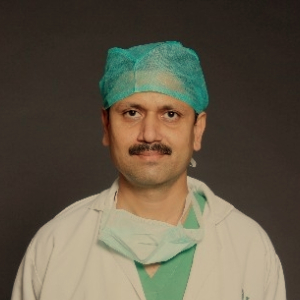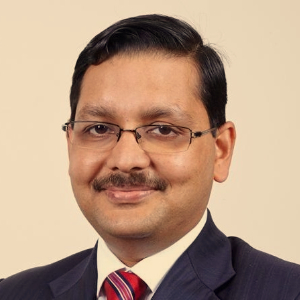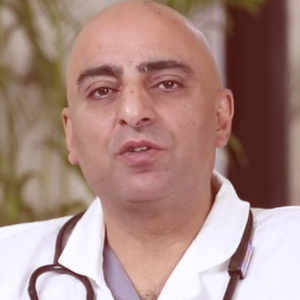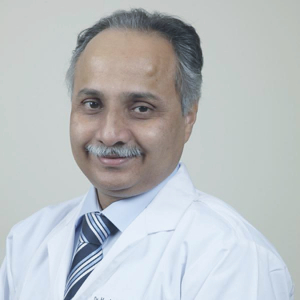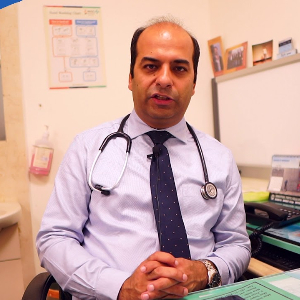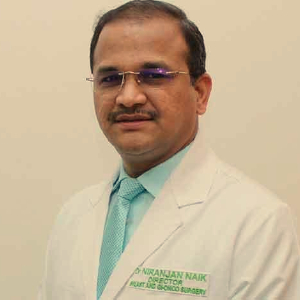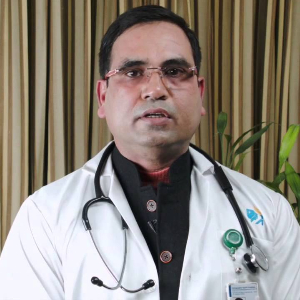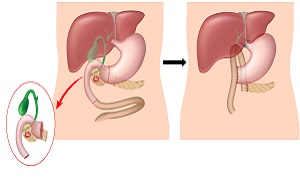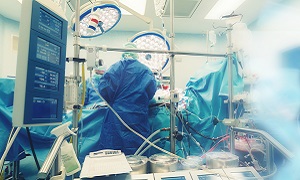Best Pancreatic Cancer Treatment Doctors in India
- Surgical Oncologist, New Delhi, India
- Over 20 years’ experience
Profile Highlights:
- Dr. S M Shuaib Zaidi is a Senior Consultant of Surgical Oncology at Apollo Cancer Institute of Indraprastha Apollo Hospital.
- His expertise lies in the surgical treatment of cancer of the lungs, esophagus, breast, GI tract, and mediastinal regions.
- Dr. Shuaib Zaidi has close to 2 decades of experience in the field of Surgical Oncology and his expertise lies in Thoracic Oncology surgery.
- Dr. Shuaib is known to have developed an innovative technique known as Radical Neck dissection for head and neck cancer surgery that helps in preserving the marginal mandibular nerve in order to ease the cosmetic outcome of the procedure.
- Dr. Zaidi also has experience in Robotic Surgery and received training in the procedure from IRCAD in Strass Bourg, France.
- Surgical Oncologist, Gurugram, India
- Over 26 years’ experience
Profile Highlights:
- Dr. Vedant Kabra is a reputed Surgical Oncologist with specializations in the surgical treatment of breast, head and neck, thoracic, urological, and GI cancers.
- He has more than 20 years of experience in the field and has performed more than 12,000 cancer surgeries related to breast, GI, head, and neck, and Thoracic and GI cancers.
- Surgical Oncologist, Chennai, India
- Over 15 years’ experience
Profile Highlights:
- Dr. Ajit Pai is one of the best Oncologists in the country with ‘n’ number of prizes and awards on his list of achievements.
- He has done specialized courses in the treatment and management of GI cancers, gynecological cancers, and cancer of food pipes.
- Surgical Oncologist, New Delhi, India
- Over 26 years’ experience
Profile Highlights:
- Dr. Sameer Kaul is a surgical oncologist at Apollo Cancer Institute of Indraprastha Apollo Hospital, New Delhi
- He is the head of an independent Surgical Oncology Unit that comprises senior and junior consultants along with oncology nurses and other staff.
- Dr. Kaul performs all kinds of cancer surgeries related to the head and neck, breast, thoracic region, GI, genitourinary, soft tissues, and bones.
- He has 26+ years of experience in Surgical Oncology and has received his training from leading cancer centers of the world.
- Prior to joining Apollo, Dr. Sameer Kaul served in various other hospitals in India taking up different cancer cases and providing successful treatment.
- Dr. Sameer Kaul has extensive experience in Robotic surgeries and performs several of his procedures through Robotic techniques.
- He constantly works towards providing the best cancer care to the underprivileged section of society and therefore founded BCPBF – The Cancer Foundation, an NGO that works towards spreading cancer awareness.
- Dr. Kaul has been responsible for bringing various new and advanced techniques for cancer treatment to the country.
- He popularized Radio Frequency Ablation, Reconstruction for CA breast, and Post insertion in India
- Surgical Oncologist, New Delhi, India
- Over 30 years’ experience
Profile Highlights:
- Dr. Harit Chaturvedi is considered among the best surgical oncologists in India. He has over 3 decades of experience in Surgical Oncology and provides services for the surgical treatment of various types of cancers affecting the breast, head and neck, oral, abdomen, and GI regions.
- He performs surgeries for cancer patients for the removal of both breasts and lymph nodes, removal of part or entire thyroid gland, breast-conserving surgery, surgery for removal of part or entire small intestine, surgery for prostate cancer, etc.
- Surgical Oncologist, New Delhi, India
- Over 40 years’ experience
Profile Highlights:
- Dr. Ramesh Sarin is one of the best surgical oncologists in India, with a mammoth experience of 49 years.
- Furthermore, the veteran oncologist focuses on managing breast cancer and related disorders like sentinel node biopsy.
- She is also interested in Phyaryngeal Cancer, Uterine Cancer, Bladder Cancer, Cervical Cancer, Liver Cancer, Fallopian Tube Cancer, Bone Cancer, Lung Cancer, Colon and Rectal Cancer, Lymphedema, and Brain Cancer.
- Medical Oncologist, Gurugram, India
- Over 16 years’ experience
Profile Highlights:
- Dr. Ankur Bahl is a reputed medical oncologist in India.
- With over 16 years of experience, Dr. Bahl is considered for his expertise in treating Multiple Myeloma, Lymphoma, Leukemia, Gastrointestinal tumors, Gynaecological Tumors, Head, Neck, and Brain Tumors.
- Surgical Oncologist, Gurugram, India
- Over 20 years’ experience
Profile Highlights:
- With 20+ years of experience, Dr. Niranjan Naik is one of the reputable names in the field of oncology and has performed more than 12000 onco-surgical operations so far, including many advanced and complex onco-surgical operations.
- Dr. Naik is generally considered one of the best Breast Cancer surgeons in India. He is also well versed in diagnostic and therapeutic endoscopic procedures.
- Surgical Oncologist, New Delhi, India
- Over 20 years’ experience
Profile Highlights:
- One of the finest oncologists in India, Dr. Ruqaya Ahmad Mir has been practicing surgical oncology for the past 20 years and is currently functioning as a Senior Consultant, Oncology at Indraprastha Apollo Hospital, New Delhi.
- Dr. Ruqaya Mir is known for her outstanding performance in some of the advanced surgical techniques which include Uterus and Ovary and Limb Conservation surgery and Cytoreductive surgery and Hyperthermic Intraperitoneal chemotherapy for advanced colorectal and recurrent ovarian malignancies.
- She is also a well trained Robotic Surgeon practicing implementation of minimal invasion in surgical oncology.
- Medical Oncologist, New Delhi, India
- Over 20 years’ experience
Profile Highlights:
- Dr. P K Das is one of the best Oncologists in India with an extensive career as the Senior Consultant Medical Oncologist, the Hemato- Oncologist, and Academic Coordinator of Dept of medical oncology at the Apollo Cancer Institute in New Delhi.
- With many years of experience at the Apollo Hospital, Dr. P K Das has been diligently treating patients and proactively contributing to the medical sector by working alongside topmost doctors in medical oncology.
Best Pancreatic Cancer Treatment Hospitals in India
Indraprastha Apollo Hospital, New Delhi
- City: New Delhi, India
Hospital Highlights:
- Indraprastha Apollo Hospital is a 700-bedded multispecialty hospital in the heart of the capital of India. It is a part of Apollo Hospital group, one of India’s most reputed healthcare chains. Indraprastha Apollo Hospital has been accredited by Joint Commission International, making it the first internationally accredited hospital in the country in 2005.
- There are 52 specialties in the hospital with one of the best cardiology centers in the country. The hospital is also equipped with State of the art infrastructure facilities with the largest Sleep Lab in Asia and the largest number of ICU bed facilities in India.
- The hospital also has one of the largest dialysis units in India along with a dedicated Bone Marrow Transplant unit.
- The latest and highly advanced technologies that are installed in the hospital include Da Vinci Robotic Surgery System, PET-MR, PET-CT, Cobalt-based HDR Brachytherapy, Brain Lab Navigation System, Tilting MRI, Portable CT scanner, 3 Tesla MRI, 128 Slice CT scanner, DSA Lab, Endosonography, Hyperbaric Chamber and Fibro scan.
Fortis Memorial Research Institute, Gurugram
- City: Gurugram, India
Hospital Highlights:
- Fortis Memorial Research Institute is a multi-super-specialty, quaternary care hospital with 1000 beds. The hospital comprises reputed clinicians, and international faculty and is also equipped with cutting-edge technology. The hospital is a part of Fortis Healthcare Limited, a reputed chain of private hospitals in India.
- It is a NABH-accredited hospital that is spread across 11 acres of land and has a capacity of 1000 beds. The hospital has 55 specialties and is one of the premier health care centers in the Asia Pacific region popularly known as “the Mecca of Healthcare”.
- The hospital has 260 diagnostic centers and is also equipped with the latest and advanced techniques that include 3 Telsa which is the world’s first Digital MRI technology. The hospital also has world-class Radiation Therapy techniques which have been developed by leading technology experts from Elekta and Brain Lab.
Apollo Hospital, Chennai
- City: Chennai, India
Hospital Highlights:
- Apollo Hospitals, Chennai, is one of the best hospitals for heart care in India. Over the years, Apollo has expanded all over India, as a healthcare chain.
- India’s first ‘Only Pancreas’ transplant was performed in Apollo Hospital. The hospital is known for successfully performing Asia’s first en-bloc combined heart and liver transplant, and over the years, it has attained a remarkable achievement in the global healthcare space. Around 3-4 organ transplants are performed in the hospital per day.
- Equipped with over 500 beds, this hospital in Chennai was established in 1983 and since then has been among the most preferred hospital for patients from all over the world.
- The hospital holds accreditation of the NABH and JCI and is the first hospital in India to be ISO 9001 and ISO 14001 certified. It is also the first South Indian Hospital to receive subsequent reaccreditation from the JCI USA 4 times.
Medanta-The Medicity, Gurgaon
- City: Gurugram, India
Hospital Highlights:
- One of India’s best and largest multi-specialty hospitals, Medanta was built with the aim to bring India to the highest standards of medical care. The hospital has been providing the best medical services to its patients, since its inception, with care, commitment, and compassion.
- Equipped with 1250 beds, the hospital was founded by Dr. Naresh Trehan in the year 2009 with an aim to provide the best medical care at affordable costs. The hospital is spread across 43 acres and includes 45 operation theatres and 350 beds dedicated solely to ICU. The hospital includes over 800 doctors, and more than 22 specialty departments and has a dedicated floor for individual specialty in order to offer the best services under one roof.
- The hospital is considered one of the premier institutes in India for Cardiac Care and includes staffs and members of high caliber. The hospital has 6 distinct centers of excellence.
Max Super Specialty Hospital, New Delhi
- City: New Delhi, India
Hospital Highlights:
- One of the well-regarded providers in India committed to the highest standards of clinical excellence and patient care, Max Super Specialty Hospital is a part of Max Healthcare, which is the second-largest healthcare chain in India. Regarded as one of the most well-regarded healthcare providers in the country, Max Super Specialty Hospital is committed to the highest standards of clinical excellence as well as patient care. The hospital is also equipped with the latest technology as well as cutting-edge research. The hospital is known to deliver and ensure the highest level of patient care.
- The hospital has more than 500 beds and offers treatment for over 35 specialties. The hospital also holds the credit of having installed the first Brain Suite in Asia. This is a highly advanced Neurosurgical machine that allows MRI to be taken while surgery is ongoing.
- Other advanced and latest technologies are also installed in the hospital such as the 1.5 Tesla MRI machine, 64 Slice CT Angiography, 4D ECHO, LINAC, and 3.5T MRI machine.
Artemis Hospital, Gurugram
- City: Gurugram, India
Hospital Highlights:
- One of the most well-known hospitals in the Delhi NCR, Artemis Hospital is the first hospital in Gurugram to get accredited by the Joint Commission International.
- With more than 40 specialties, the hospital has been designed to be one of the most technically advanced hospitals in the country, with the best medical and surgical health care. The hospital has eleven special and dedicated centers, for Heart, Cancer, Neurosciences, etc.
- The latest technologies in the hospital include Endovascular Hybrid Operating Suite and Flat panel Cath Labs for the cardiovascular department, 3 Tesla MRI, 16 slice PET CT, 64 Slice Cardiac CT Scan, HDR Brachytherapy, and highly advanced Image Guided Radiation Therapy techniques (LINAC) are installed in the hospital.
- The hospital has won several awards as well, since its inception.
BLK Max Super Specialty Hospital, New Delhi
- City: New Delhi, India
Hospital Highlights:
- Equipped with 650 beds, BLK Superspecialty Hospital is the largest stand-alone private sector hospital in Delhi.
- With over 1500 healthcare providers and 150 globally renowned super specialists, the hospital is one of Asia’s largest Bone Marrow Transplant Centres. The hospital is known for having some of the best cancer doctors in the country.
- The hospital is NABH and NABL accredited and was inaugurated by the first Prime Minister of India. Pt. Jawahar Lal Nehru.
Gleneagles Global Hospitals, Chennai
- City: Chennai, India
Hospital Highlights:
- Established in 1999, Gleneagles Global Hospital, Chennai, is one of the top healthcare facilities in Southern India. It is part of the Gleneagles Hospital Chain, which is the fourth largest healthcare chain in the country. The hospital specializes in multi-organ transplants of kidneys, liver, lungs, heart, etc.
- The hospital has an excellent infrastructure and state-of-the-art lab and equipment set-up. The hospital boasts cutting-edge technologies, a highly skilled team of doctors and surgeons, and trained support staff. Located in Perumbakam, Chennai, it is one of India’s premier health care destinations. The hospital has performed some of the most complex surgical and clinical procedures in India including multi-organ transplantations.
- The hospital’s lung transplantation program is one of the best in the country. The hospital is known for having performed India’s first single lung transplant and first minimal invasive lung transplant. It is also the only Indian hospital to be associated with King’s College Hospital, London, United Kingdom for liver transplantations.
Fortis Hospital, Mulund, Mumbai
- City: Mumbai, India
Hospital Highlights:
- Fortis Hospital in Mulund is a 315-bed multi-speciality tertiary care hospital with five JCI accreditations that offers a wide variety of diagnostic and therapeutic services. The Fortis Hospital in Mulund delivers patient-centred treatment with cutting-edge technology, highly skilled and experienced surgeons, and paramedical staff.
- This institution houses Maharashtra’s largest multi-organ transplant centre. It is also the first heart transplant centre in western India to conduct 100 or more consecutive heart transplants in under four years. It is the only hospital in the city to have multi-organ transplants and has handled the youngest patient for angioplasty. Fortis Hospital Mulund now boasts the first advanced surgical robot in central Mumbai.
- Cardiology and heart surgery, urology, nephrology, neurosciences, orthopaedics, digestive care, emergency and critical care, and maternity care are among the services provided by the hospital.
Kokilaben Dhirubhai Ambani Hospital, Mumbai
- City: Mumbai, India
Hospital Highlights:
- Kokilaben Dhirubhai Ambani Hospital, Named after the wife of Indian industrialist Dhirubhai Ambani, the founder of Reliance Industries, this is one of the top hospitals in Mumbai. This 750-bed multi-specialty hospital became operational in 2009. Known as one of India’s most advanced tertiary care facilities, the hospital is designed to raise India’s global standing as a healthcare hub, with an emphasis on excellence in clinical services.
- Kokilaben Dhirubhai Ambani Hospital uses Protocol and Care Pathway based treatment models to ensure the best outcomes for patients.
- The hospital represents a confluence of top-notch talent, cutting-edge technology, state-of-the-art infrastructure, and, most importantly commitment.
- The hospital also holds the accreditation of the NABH, NABL, CAP, and JCI.
- The hospital has been recognized as the No. 1 Multispecialty Hospital in Mumbai and the West Zone for the fifth year in a row in 2020 by The Week.
Pancreatic Cancer
Pancreatic Cancer is the cancer that begins in the tissues of the pancreas.
Pancreas is the organ that lies behind the lower part of the stomach. The main function of pancreas is that it releases enzymes that help in digestion & hormones that manages the blood sugar level.
Pancreatic cancer is hardly ever detected in early stages since it shows no symptom in early stages. It gets noticed when it has already spread to other organs (4th or 5th stage), thereby making treatment quite difficult.
Signs & symptoms of Pancreatic Cancer
- Fatigue
- Loss of appetite
- Jaundice
- Pain in the upper abdomen.
- Back pain
- Nausea & vomiting
- Malaise, feeling of discomfort or unease whose exact cause is not known.
Causes & risk factor of Pancreatic Cancer
- Smoking
- Diabetes
- Family history of pancreatic cancer.
- Pancreatitis (swelling of pancreas)
- Ulcer in the stomach
- Alcohol consumption
- Obesity
- Pancreatic cancer is more common in older people
Types of Pancreatic Cancer
There are two major types of Pancreatic Cancer:
- Exocrine Pancreatic Cancer- It is the cancer that begins in the exocrine cells, cells that produces pancreatic digestive juices. Exocrine Pancreatic Cancers make up for about 95% of Pancreatic Cancers. The sub-types of Exocrine Pancreatic Cancer are:
- Adenocarcinomas- These begin in the cells that line the ducts of the pancreas & are the most common type of exocrine pancreatic cancer, accounting for around 90% of Pancreatic cancers.
- Squamous Cell Carcinoma (rare type)
- Adenoquamous Carcinoma (rare type)
- Colloid Carcinoma (rare type)
- Endocrine Pancreatic Cancer- These begin in that part of pancreas where Insulin and other hormones are made and released directly into the blood. Endocrine Pancreatic Cancers are named after the hormone they produce like gastrinomas produce a gastrin & insulinomas produce insulin to name a few. They make up for less than 5% of Pancreatic Cancers.
*Benign cysts and lesions in Pancreas- These can be precancerous formations and are generally removed once noticed, or closely monitored for malignancy.
Stages of Pancreatic Cancer
- Stage 1: Cancer is limited to the pancreas.
- Stage 2: Cancer is confined to the pancreas but the tumour has grown in size (greater than 2 but no more than 4 centimeters).
- Stage 3: The tumour is over 4 centimeters in size and the cancer may have spread to nearby lymph nodes.
- Stage 4: The cancer has spread to the nearby blood vessels or nerves.
- Stage 5: Cancer has spread to distant organs.
Diagnosis of Pancreatic Cancer
- Blood Test
- PET scan- It helps to check the degree of pancreatic cancer spread
- Endoscopic Ultrasound
- MRI
- Biopsy- Tissue sample from the suspicious area is taken & send for examination. Biopsy can be performed in the following way:
- Percutaneous needle biopsy also known as fine needle aspiration (FNA)- A needle is inserted into the mass & some tissue is captured.
- Endoscopic retrograde cholangiopancreatography (ERCP)- In this process a flexible tube with a camera and other tools on its end (endoscope) is put through the mouth to the small intestine, near the pancreas. & helps to collect images as well as tissue sample of the affected area.
Treatment of Pancreatic Cancer
The Treatment of Pancreatic Cancer depends on the stage and grade of cancer. After evaluation of the aforesaid through proper investigations, your oncology team will decide on your treatment plan or protocol. Following are the options considered for effective Pancreatic Cancer Treatment.
Surgery
There are quite a few different types of surgery that are done for Pancreatic Cancer depending on the size of the tumor and organs involved.
Whipple Procedure
It is also known as pancreaticoduodenectomy. In this procedure, the head of the pancreas, the first part of the small intestine (duodenum), the gallbladder and the bile duct and nearby lymph nodes are removed. In some situations, part of the stomach and colon can be removed. The surgeon that reconnects the remaining parts of pancreas, stomach and small intestine to enable digestion of food.
Distal Pancreatectomy
Total Pancreatectomy
The entire pancreas and the spleen are removed. You can actually lead a normal life after Pancreatectomy. However, you will need lifelong insulin and enzyme replacement as these are the functions of the pancreas.
Chemotherapy
Chemotherapy is the use of anti-cancer drug that helps to slow or stop the growth of rapidly dividing cells that cause cancer. It prevents the growth of rapidly dividing cells by killing the dividing cells.
Despite its side effects, chemo is still the most widely used cancer treatment option. Unlike radiation and surgery which treats cancer cells at particular locations, chemotherapy drugs can kill cancer cells that have metastated (spread) to different organs in the body.
Targeted drug therapy
Targeted therapy is a type of cancer treatment that uses cancer drugs. However, it is different from traditional chemotherapy, which also uses drugs to kill cancer cells. In Targeted therapy, the cancer’s specific genes, proteins, or the tissue environment that contributes to cancer growth and survival are targeted. Targeted therapy is generally used with chemotherapy and other interventions.
Radiation therapy
Radiation Therapy is a kind of cancer treatment that uses high doses of radiation beams to kill cancer cells to shrink the tumors. Radiation kills the cancer cells by destroying the DNA. Cancer cells with damaged DNA fail to multiply and die. They are then removed by the body’s mechanism.

